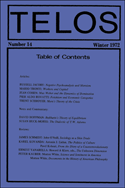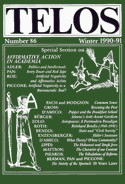By Telos Press · Monday, December 8, 2014 On The Agenda with Steve Paikin, Michael Millerman discusses the philosophy of Alexander Dugin and its influence on Vladimir Putin and contemporary Russian geopolitics. It’s a wide-ranging interview that covers Dugin’s theory of Eurasianism, his critique of the West and liberal democracy, the defense of Russia as a unique, non-Western civilization in its own right, the compatibility of Dugin’s anti-communism with the view that the collapse of the Soviet Union was a geopolitical catastrophe, the difference between Western multiculturalism and the kind of multicivilizational diversity that Dugin advocates, and much more. Watch the full interview below. In addition to co-translating Dugin’s The Fourth Political Theory (Arktos, 2012), Michael is also a former Telos intern. You can read more of his writing in the TELOSscope archives.
Continue reading →
By Telos Press · Sunday, December 7, 2014 Writing in the Washington Post, George Will discusses Joel Kotkin’s The New Class Conflict (recently published by Telos Press) and the reasons why today’s government serves the wealthy and powerful.
Continue reading →
By Joseph van der Naald · Wednesday, December 3, 2014  Mario Tronti’s postscript to the second edition of his publication Operai e Capitale, published in Telos in 1972 as “Workers and Capital,” provides the reader with a summation of his thought on the development of the “mass worker,” presented through an analysis of notable labor struggles across the Western world. Tronti’s methodology, which he briefly explicates at the beginning of the piece, delineates certain historical workers’ struggles in order to examine “macroscopic groups of facts yet untouched by the critical consciousness of labor thought” (25). His purpose is to yield “an historical model, a privileged period of research” (25) so as to better analyze the emergence of the autonomy of the working class engaged in a dialectical struggle with capital. Mario Tronti’s postscript to the second edition of his publication Operai e Capitale, published in Telos in 1972 as “Workers and Capital,” provides the reader with a summation of his thought on the development of the “mass worker,” presented through an analysis of notable labor struggles across the Western world. Tronti’s methodology, which he briefly explicates at the beginning of the piece, delineates certain historical workers’ struggles in order to examine “macroscopic groups of facts yet untouched by the critical consciousness of labor thought” (25). His purpose is to yield “an historical model, a privileged period of research” (25) so as to better analyze the emergence of the autonomy of the working class engaged in a dialectical struggle with capital.
Continue reading →
By Patrícia Vieira · Monday, December 1, 2014 Christopher Nolan’s Interstellar paints the portrait of a brave new time in the future when we will finally cut the shackles attaching us to our dying home planet and embrace our nomadic nature. Having turned the earth into a gigantic dust bowl, where the soil is increasingly barren and the air unbreathable, we will move on to greener pastures, in the shape of as yet unpolluted planets in faraway galaxies. After all, why shouldn’t planets be more like paper tissues—one soiled and tossed, another one already on the way?
Continue reading →
By Telos Press · Monday, December 1, 2014 For the month of December, save 20% on all Telos Press books purchased at our website. Now is a great time to pick up copies of some of our newest publications, including Matthias Küntzel’s Germany and Iran: From the Aryan Axis to the Nuclear Threshold and Joel Kotkin’s The New Class Conflict. In our online store you’ll also find key works by Ernst Jünger, such as On Pain and The Forest Passage, as well as Carl Schmitt’s Theory of the Partisan and The Nomos of the Earth. You can browse our full selection of books here.
Continue reading →
By Lukas Szrot · Tuesday, November 25, 2014 As Popper has written in several articles and his autobiography, he encountered Marxism as a young man in Austria around 1919. For two or three months he called himself a communist, but soon turned against the doctrine after the deaths of pro-communist demonstrators was justified with what Popper considered pseudo-scientific jargon. These events made him a fallibilist acutely aware of the distinction between dogmatic and critical thinking. (34)
 This emotionally powerful and philosophically significant experience colored Popper’s views of Marxism, the call for revolutionary social change, and the utopianism that foments it. In light of this, it is not difficult to see why Popper and (in particular early) Critical Theorists might have found much about which to disagree. Robert D’Amico discusses myriad points of contrast between Karl Popper and the Frankfurt School, though from the outset he acknowledges that the “infamous ‘methodology dispute’ in German sociology that occurred primarily between Popper and Adorno . . . is best described as a misfire” (33). Despite this alleged “misfire,” D’Amico’s analysis raises profound questions that continue to gain attention and prod ongoing debate in terms of the philosophy, theory, and methodology of the social sciences. This emotionally powerful and philosophically significant experience colored Popper’s views of Marxism, the call for revolutionary social change, and the utopianism that foments it. In light of this, it is not difficult to see why Popper and (in particular early) Critical Theorists might have found much about which to disagree. Robert D’Amico discusses myriad points of contrast between Karl Popper and the Frankfurt School, though from the outset he acknowledges that the “infamous ‘methodology dispute’ in German sociology that occurred primarily between Popper and Adorno . . . is best described as a misfire” (33). Despite this alleged “misfire,” D’Amico’s analysis raises profound questions that continue to gain attention and prod ongoing debate in terms of the philosophy, theory, and methodology of the social sciences.
Continue reading →
|
|
 Mario Tronti’s postscript to the second edition of his publication Operai e Capitale, published in Telos in 1972 as “Workers and Capital,” provides the reader with a summation of his thought on the development of the “mass worker,” presented through an analysis of notable labor struggles across the Western world. Tronti’s methodology, which he briefly explicates at the beginning of the piece, delineates certain historical workers’ struggles in order to examine “macroscopic groups of facts yet untouched by the critical consciousness of labor thought” (25). His purpose is to yield “an historical model, a privileged period of research” (25) so as to better analyze the emergence of the autonomy of the working class engaged in a dialectical struggle with capital.
Mario Tronti’s postscript to the second edition of his publication Operai e Capitale, published in Telos in 1972 as “Workers and Capital,” provides the reader with a summation of his thought on the development of the “mass worker,” presented through an analysis of notable labor struggles across the Western world. Tronti’s methodology, which he briefly explicates at the beginning of the piece, delineates certain historical workers’ struggles in order to examine “macroscopic groups of facts yet untouched by the critical consciousness of labor thought” (25). His purpose is to yield “an historical model, a privileged period of research” (25) so as to better analyze the emergence of the autonomy of the working class engaged in a dialectical struggle with capital.  This emotionally powerful and philosophically significant experience colored Popper’s views of Marxism, the call for revolutionary social change, and the utopianism that foments it. In light of this, it is not difficult to see why Popper and (in particular early) Critical Theorists might have found much about which to disagree. Robert D’Amico discusses myriad points of contrast between Karl Popper and the Frankfurt School, though from the outset he acknowledges that the “infamous ‘methodology dispute’ in German sociology that occurred primarily between Popper and Adorno . . . is best described as a misfire” (33). Despite this alleged “misfire,” D’Amico’s analysis raises profound questions that continue to gain attention and prod ongoing debate in terms of the philosophy, theory, and methodology of the social sciences.
This emotionally powerful and philosophically significant experience colored Popper’s views of Marxism, the call for revolutionary social change, and the utopianism that foments it. In light of this, it is not difficult to see why Popper and (in particular early) Critical Theorists might have found much about which to disagree. Robert D’Amico discusses myriad points of contrast between Karl Popper and the Frankfurt School, though from the outset he acknowledges that the “infamous ‘methodology dispute’ in German sociology that occurred primarily between Popper and Adorno . . . is best described as a misfire” (33). Despite this alleged “misfire,” D’Amico’s analysis raises profound questions that continue to gain attention and prod ongoing debate in terms of the philosophy, theory, and methodology of the social sciences. 

